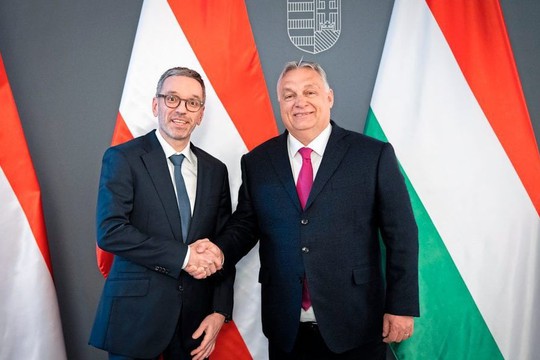Austrian Freedom Party (FPO) leader Herbert Kickl (left) with Hungarian leader Viktor Orban.
Photo: Derstandard
The far-right favourites to win Austria's next election have forged an alliance with Hungarian leader Viktor Orban that could deepen defiance of Brussels and threaten already fragile consensus over the Ukraine war if they take power, writes Reuters.
Orban, prime minister of Austria's old imperial partner and an ally of U.S. presidential candidate Donald Trump, has often blocked or delayed major European Union decisions such as sanctions against Russia and aid for Ukraine, wringing concessions from the bloc in the process.
While other hardline nationalists now heading European governments have taken a more moderate path, Austrian Freedom Party (FPO) leader Herbert Kickl has aligned his party closely with Orban, the self-styled champion of "illiberal democracy".
"We're entering what I would like to call a new era in European politics," Kickl said with Orban announcing their European alliance in June in a Vienna hotel alongside Andrej Babis, head of the biggest party in the Czech Republic's lower house, and a former prime minister of that country.
Other parties including Marine Le Pen's National Rally in France joined that alliance within days, making it the third-biggest political group in the European Parliament.
An FPO-led government would exacerbate difficulties Europe has staying united to supply weapons and aid to Kyiv and opposing gambits like Orban's trip to Moscow last month, which upset EU officials.
Kickl, who has called European Commission chief Ursula von der Leyen a "warmonger", said last month he and Orban backed a "peaceful solution to the war between Ukraine and Russia" and pointed to Pope Francis' remark that Kyiv should have the "courage of the white flag" to negotiate peace.
But pressure on Ukraine to come to terms with Russia is also emanating from Slovakia, which like the Czech Republic was also once part of the Austro-Hungarian empire that dominated central Europe before the First World War.
Slovak Prime Minister Robert Fico pursues friendly ties with Moscow, has ended military aid for Ukraine and opposes Kyiv joining NATO. However, he has not joined the alliance forged by Kickl and Orban, who Austria's far-right has long been courting.
Originating on the political left, Fico has said his party will stay out of the main centre-left group in the European Parliament after its suspension in October for forming a coalition with a far-right party in Slovakia.
Neutral Austria does not send arms to Ukraine, and lingering business ties between one of its biggest banks and Russia have alarmed Washington. It still imports most of its natural gas from Russia despite efforts to kick that habit.
Like European peers, the FPO combines tough rhetoric on immigration and Islam with promises to reduce what it regards as interference from Brussels in national affairs.
Polls have long shown the FPO in first place ahead of Chancellor Karl Nehammer's conservative People's Party (OVP). But even if it wins September's general election it faces serious obstacles to leading government for the first time.
Many Austrians hold the view that not provoking major powers like Russia keeps them safe, and polls show a clear majority of voters want the country to stay neutral.
Kickl is therefore generally careful to argue his Ukraine policy is about threats to Austrian neutrality, rather than directly praising Putin, said political analyst Thomas Hofer.
read more in our Telegram-channel https://t.me/The_International_Affairs

 11:03 08.08.2024 •
11:03 08.08.2024 •























